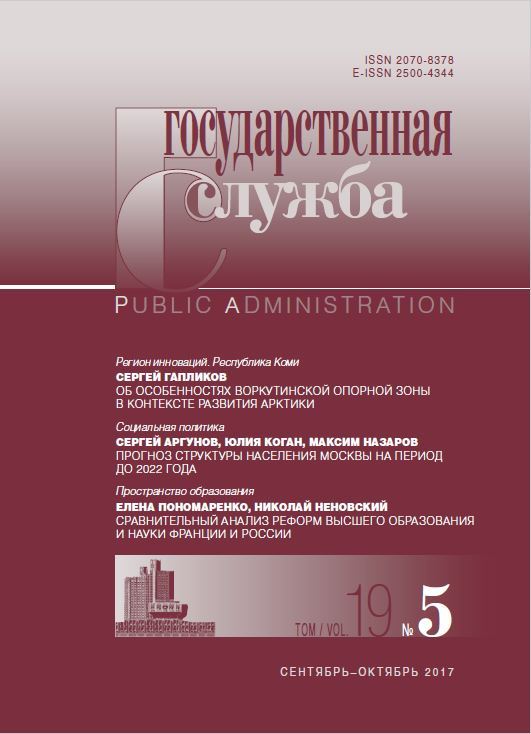Рекомендуемая ссылка на статью:
Лидия Николаевна Тимофееваа
аРоссийская академия народного хозяйства и государственной службы при Президенте Российской Федерации
DOI: 10.22394/2070-8378-2017-19-5-11-18
Аннотация:
В статье дается авторская концепция управления через сотрудничество российского государства и общества на основе анализа социологических исследований, связанных с развитием их взаимоотношений в постсоветский период. В основу положена теория модернизации Р. Инглхарта и К. Вельцеля, которая опирается на основные выводы классических концепций модернизации К. Маркса и М. Вебера. Подлинная демократия зависит от степени соучастия народа в управлении. Эмансипация общества, способного к управлению через сотрудничество с государством, проходит определенные этапы его модернизации: социально-экономическое развитие приводит к системному сдвигу от традиционных ценностей к ценностям самовыражения и создает условия для формирования демократических институтов. Эффективная демократия с большей вероятностью возникает в обществе, где носителями ценностей самовыражения являются более 45% населения. Естественно, что при возникновении угрозы физическому выживанию людей преобладающее значение получают ценности выживания, что ведет к упрочению института авторитаризма, и тогда вопрос об управлении через сотрудничество государства и общества не актуален, либо это сотрудничество превращается в формальную демократию, когда имеются «бутафорские институты», гражданские и политические права, но правящая элита игнорирует их и действует по собственному усмотрению. Такая ситуация может спровоцировать неконвенциональные формы поведения граждан. Ответственность за результат управления через сотрудничество в равной степени несут обе стороны.
Abstract:
The author’s concept of governing through cooperation of the Russian state and society is given in the article on the basis of the analysis of sociological studies related to the development of their mutual relations in the post-Soviet period. The theory of modernization of R. Inglhart and K. Veltsel is based on the main conclusions of the classical concepts of modernization by Karl Marx and M. Weber. True democracy depends on the degree of people’s participation in governance. The emancipation of a society that is able to manage through cooperation with the state passes through certain stages of its modernization: socio-economic development leads to a systematic shift from traditional values to values of self-expression and creates conditions to form democratic institutions. Effective democracy is more likely to emerge in a society where more than 45% of population bears the values of self-expression. Naturally, when there is a physical threat to survival of people, the values of survival are of paramount importance, which leads to strengthening of the authoritarianism institution and then the issue of governance through cooperation between the state and society is not relevant, or this cooperation turns into a formal democracy, when there are “sham institutions”, civil and political rights, but the ruling elite ignores them and acts at its own discretion. Such a situation can provoke nonconventional forms of behavior for citizens. Both parties share the responsibility for the result of governing through cooperation equally.
Ключевые слова:
управление через сотрудничество, модернизация, ценности самовыражения, ценности самовыживания, эффективная демократия, формальная демократия, ответственность правящей элиты, ответственность активной общественности
Keywords:
governing through cooperation, modernization, values of self-expression, values of self-survival, effective democracy, formal democracy, responsibility of the ruling elite, responsibility of active society
References:
Chernysh M.F. Social differentiation in modern society: the multiplicity of forms. Russia: the transforming society, ed. Yadov V.Y. Moscow: CANON-press-C, 2001. Pp.77-89. In Russian.
Gorshkov M.K., Sedova N.N. Self-sufficient Russians and their life priorities. Sociologicheskiye Issledovaniya. 2015, No.12. Pp.4-16. In Russian.
Inglehart R. and Welzel K. Modernization, Cultural Change and Democracy: The Sequence of Human Development. Мoscow.: Novoye izdatel’stvo, 2011. In Russian.
Martinelli A. Global Modernization. Rethinking the project of modernity. St. Petersburg: Publishing House of St. Petersburg State University, 2006. In Russian.
Levada Y.A., Shanin T. History of Generations and Generational History. Chelovek. Soobshchestvo. Upravleniye. 2005, No. 3, Pp.6-25. In Russian.
Lisovskiy V.T. Sociology of Youth: History and Modernity. Sociology and society. Thesis report of the First All-Russian Sociological Congress. St. Petersburg: Piter, 2000. P.166. In Russian.
Petukhov V.V. Democracy and participation: new challenges. Svobodnaya mysl. 2013. No.2. Pp.133-148. In Russian.
Power, business, civil society: models of interaction (domestic and foreign experience). Rostov-na-Donu: Publishing house of the URIU RANEPA, 2016. In Russian.
Starostin A.M. 2012a. Social and humanitarian innovations in the context of philosophical pragmatics. Rostov-na-Donu.: Donizdat, 2012. In Russian.
Starostin A.M., Ponedelkov A.V., Shvets L.G. Civil Society in Russia in the Context of Innovation Transfer. Vlast. 2016. No.5. Pp.5-15. In Russian.
Weizel C. Fluchtpunkt Humanentwicklung: Uber die Grundlagen der Demokratie und die Ursachen ihrer Ausbreitung. Opladen: Verlagе. 2002. In Russian.
Yasin E.G. “Modernization of the economy and the system of values”. Moscow: Higher School of Economics, 2003. In Russian.
Статьи в режиме Open Access публикуются в соответствии с лицензией Creative Commons Attribution 4.0 International (CC BY).

